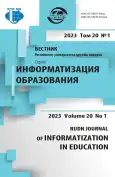Joint project-based training of IT students based on the use of version control tools and task separation in the project
- 作者: Rochev K.V.1, Semyashkina A.V.1
-
隶属关系:
- Ukhta State Technical University
- 期: 卷 20, 编号 1 (2023)
- 页面: 52-62
- 栏目: TEACHING COMPUTER SCIENCE
- URL: https://journal-vniispk.ru/2312-8631/article/view/321288
- DOI: https://doi.org/10.22363/2312-8631-2023-20-1-52-62
- EDN: https://elibrary.ru/CCZGJZ
- ID: 321288
如何引用文章
全文:
详细
Problem statement. The relevance of the work lies in the proposed combination of methods and tools for application development during the educational process, which repeats frequent situations in industrial software development. The goal is to create conditions that allow to gain collective development skills close to real participation in software production. Methodology. During the training, students will write separate parts of the overall project, embedding their solution into the general logic of the system based on the implementation of the class interface set by the teacher. At the same time, frequently used design patterns are described and applied, such as model-view-controller, strategy, etc. The augmented project is synchronized between the participants using a version control system. As a result, students have a full-fledged application, parts of which are written by individual participants. Results. The implementation of the approach is considered on the example of the game “Chess”, in which each of the students can write the code of a separate figure; the possibilities of applying the approach within one or more classes and the potential risks of its use are indicated. Conclusion. The proposed approach allows students to gain work experience close to industrial programming and master such competencies as joint development, work in version control systems and building modular systems.
作者简介
Konstantin Rochev
Ukhta State Technical University
编辑信件的主要联系方式.
Email: k@rochev.ru
ORCID iD: 0000-0002-2720-3209
Candidate of Economics, Associate Professor, Department of Computer Engineering, Information Systems and Technologies, Faculty of Economics, Management and Information Technologies
13 Pervomayskaya St, Ukhta, 169300, Russian FederationAnastasia Semyashkina
Ukhta State Technical University
Email: asemyashkina@ugtu.net
ORCID iD: 0000-0002-6781-0396
senior lecturer, Department of Computer Engineering, Information Systems and Technologies, Faculty of Economics, Management and Information Technologies
13 Pervomayskaya St, Ukhta, 169300, Russian Federation参考
- Makletsov SV, Starshinova TA, Zaripov RN. Integration of educational and professional activities in the preparation of IT students based on the Github service. Management of Sustainable Development. 2020;(5):100–104. (In Russ.)
- Makletsov SV, Starshinova TA. E-learning is a new means of implementing integrative and differentiated approaches (on the example of bachelors studying in the field of mathematics and computer science). Kazan: KNITU Publ.; 2015. (In Russ.)
- Zhilyaev AN, Oleinik AI. Actual problems of training and development of human resources in the IT industry. Quality. Innovation. Education. 2015;(12):9–22. (In Russ.)
- Starshinova TA, Makletsov SV. The use of e-learning tools for the formation of information competence. Bulletin of Kazan Technological University. 2012;15(17):330–333. (In Russ.)
- Ablaeva LN, Abdulaeva UB. Foreign and domestic experience of using Github in universities. Information and Computer Technologies in Economics, Education and Social Sphere. 2019;(3):65–72. (In Russ.)
- Andropov VV. Organization of joint practical activity on remote resources. Continuum. Mathematics. Computer Science. Education. 2016;(2):46–51. (In Russ.)
- Protasevich YuA, Zmeev OA, Sokolov DA. Tools for organizing interaction between teachers and students using version control systems. Computer Science and Education. 2021;(4):36–46. (In Russ.) http://doi.org/10.32517/0234-0453-2021-36-4-36-46
- Eremeev MA, Trubienko OV, Zakharchuk II. Application of the reproducible research approach in the process of distance learning. Russian Technological Journal. 2022;10(4):86–92. (In Russ.) http://doi.org/10.32362/2500-316X-2022-10-4-86-92
- Fedotov AM, Baidavletov AT, Zhizhimov OL, Sambetbaeva MA, Fedotova OA. Digital repository in the scientific and educational information system. Bulletin of the NSU. Series: Information Technology. 2015;13(3):68–86. (In Russ.)
- Alekseevsky PI. The use of version control tools for the collective work of students on a computer game project. Pedagogical Education in Russia. 2012;(6):51–54. (In Russ.)
- Chacon S, Straub B. Git for a professional programmer. St. Petersburg: Peter Publ.; 2016. (In Russ.)
- Kozlikina YuA. Extreme programming as a risk reduction tool in software development. Information Technologies in Science, Management, Social Sphere and Medicine: Collection of Scientific Papers of the International Scientific Conference. Tomsk: National Research Tomsk Polytechnic University; 2014. p. 88–90. (In Russ.)
补充文件









